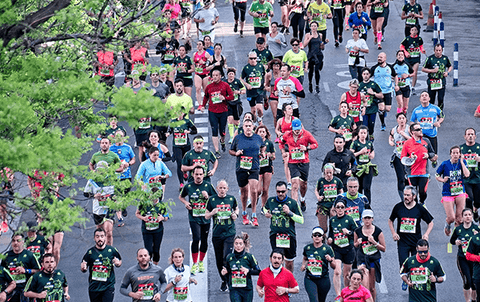Fuelling for a marathon is a crucial factor in success or failure. In fact, optimising hydration and carbohydrates can improve marathon performance by between 2 and 20%. Yet, so often runners are so focussed on their training programme that they can forget or neglect race nutrition and establishing the best solution for them. I say ‘for them’ because every runner is different. Some people prefer gels, some prefer solid foods, some prefer to get all their calories from sports drinks and others like to mix all these components together.
There is no off the peg solution in terms of what you take and what will work for you. This is something you will need to experiment with and practice in your long runs as well as in your races. Guidance on what you need in terms of intake is easier to plan.
Consuming a combination of carbohydrate and fluid is essential for sustaining energy levels throughout the race. This is because the body has a limited supply of glycogen, so after an hour of exercise it needs replenishing. It is recommended that during a marathon, a runner consumes at least 60g of carbohydrate per hour. To give a context, most energy gels contain around 25g of carbohydrate.
So, with this in mind, what are our top tips for marathon nutrition?
Practice, practice, practice
We can’t emphasise enough just how important this is. There are so many elements to get right, not just the products and combinations that are right for you, but also how you will carry your fuel, how you will take on fluid, how you will remind yourself to take something regularly. Find out how your race will provide fluid – cups? bottles? a refill for your own cups or bottles? Practice whichever scenario you will face in the race. Will you be using fuel provided by the race? If so, find out what it will be and practice taking this on your long runs. Or, will you carry your own fuel? If so, how? In pockets on your clothing, a waist belt, a backpack? See what you find the easiest to access when you are tired. Practice.

Rule of 15
Take the equivalent of 15g carbohydrate every 15 minutes (most people prefer to take this as 30g every 30 minutes). When you are tired towards the end of the race you can either forget to take fuel or may feel you’re not wanting to take anything on. This is where preparation is key; devise a way to remind yourself to take fuel, however you feel about it at the time. Some people write miles on their arm, some take something on every half hour or every 4 miles. Know what works best for you.

Start early
Do not wait for your energy levels to drop before you start taking on fuel and fluid. Some people take fuel on as early as 30 minutes into their marathon. This can be too early for many people. 60-75 minutes is a good rule of thumb for taking on your first fuel. A lack of carbohydrate will cause you to ‘hit the wall’. This is basically when you run out of energy and either have to walk or pull up.
Test different types of fuel
During a marathon the body needs fast absorbing carbohydrates that will boost glucose levels and deliver sugars from the bloodstream to the muscles. In terms of how you take this, what is important to you? Consistency? Texture? Flavour? There are so many brands on the market now it can be overwhelming knowing where to start. This takes us back to point 1 – you need to practice what suits you and your gut best. Some people love gels for their ease of carrying and taking; others can’t stomach them so prefer to rely on gel blocks or even just energy drinks. Some find chewing whilst they run easy, some find it hard enough to breathe let alone think of eating at the same time! Which do you prefer? Practice.

Stay hydrated
The amount of liquid you need during a marathon will depend on a number of factors. These include the temperature on race day, how much you sweat and how fast you are running. Everyone will need to take on some fluid, so it is advisable to take sips of water or electrolyte when you take on fuel to keep yourself hydrated. Electrolytes are minerals that keep our systems functioning; they are lost when we sweat, so will need replenishing. This is especially important in hot weather.
Drinking water alone without a balance of carbohydrates and electrolytes can result in overhydration and decreased performance, so make sure you carry an electrolyte drink with you (these can be found in tablet form that you add to water, e.g. Nunn) or that the race provides them along the route.
Featured product

Most electrolyte drinks do not contain carbohydrates, so you will need to devise your own solution to taking on fuel, electrolyte and water. Some people prefer to take on just water and electrolytes and to get all their carbohydrates through gels and food. Others prefer a combination, and others like to get all their carbohydrates from drinks. Again, this comes down to personal choice – and this you will discover by – yes, practice!
Caffeine is another component that people can use in their marathon fuelling. This warrants a conversation in its own right and so will form part of a future blog.
Hopefully the guidance above has demonstrated how many elements there are to consider in establishing the best fuelling strategy for you, for your marathon and why it is so important to get right. This is why practicing needs to be a major feature of your marathon training and not just an after thought or an ‘I’ll just wing it’ on race day.
Our parting word – practice makes perfect!


